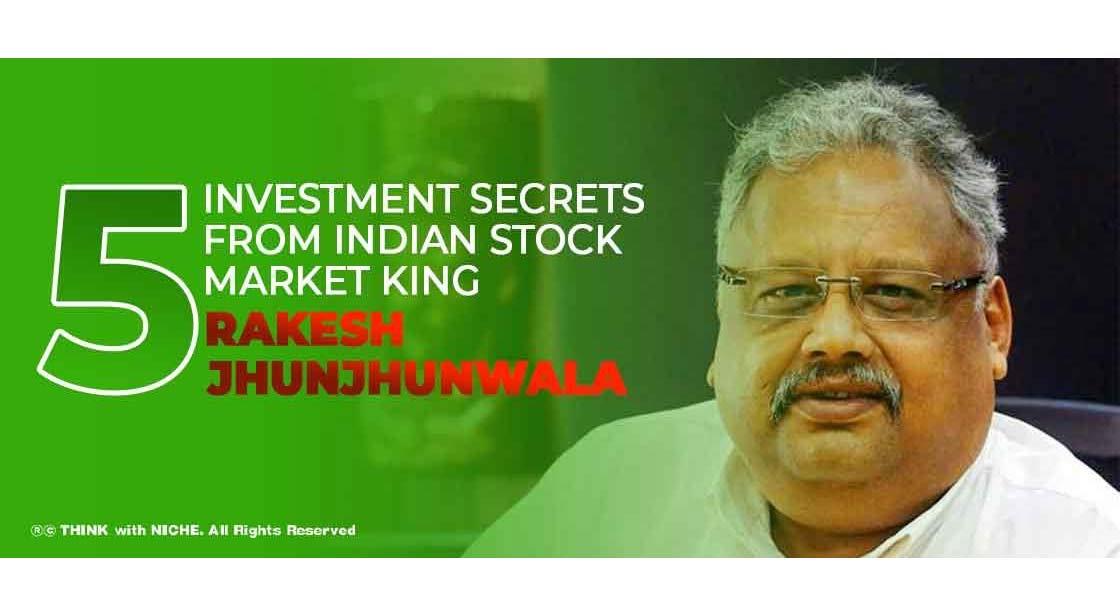5 Investment secrets from Indian Stock Market king Rakesh Jhunjhunwala

Blog Post
On Sunday morning, renowned investor Rakesh Jhunjhunwala passed suddenly. The investor known as "India's Warren Buffet" was described as having "the Midas touch." The investor was rushed to the Candy Breach Hospital around 6:45 AM and was later pronounced dead, according to sources. They said that he had recently been released from the hospital and was dealing with a number of health problems, including kidney problems.
He was one of the richest men in the nation, a businessman and chartered accountant, and his last public appearance was at the opening of Akasa Air. Jhunjhunwala served as a director of Viceroy Hotels, Concord Biotech, Provogue India, and Geojit Financial Services in addition to serving as chairman of Hungama Media and Aptech.
If you look at Rakesh Jhunjhunwala's career path, you'll notice that he has always been interested in the stock market. He used to ask his father how the stock market worked when he was 9 years old, and he was interested in how the prices fluctuated on a regular basis. After that, his desire provides him the strength to overcome the early setbacks in his career and to stay motivated in the face of setbacks. Even now, he may be seen participating in quarterly conference calls for firms in which he has investments, such as Federal Bank, Titan, and Lupin, among others. #ThinkWithNiche
A heartfelt tribute to Rakesh Jhunjhunwala from ThinkWithNiche.
#RakeshJhunjhunwala
#BigBull
#ShareMarket
#IndiasWarrenBuffet
Rakesh Jhunjhunwala is one of India's most successful and well-liked stock market investors. With about 20,000 crores in assets, he is one of India's wealthiest men. So, for every investor, here are 5 crucial lessons from Rakesh Jhunjhunwala's life:
Have a lot of patience- Rakesh Jhunjhunwala's patience with his stocks is one of his most impressive traits. Only two of his portfolio's stocks, for example, have yielded positive returns; the rest are in the red, but he doesn't seem to mind. He claims that he buys the company, not the stock and that he doesn't sell a single share as long as the company's fundamentals are sound. For example, his investment in Titan fell 30% from its peak; if one of our portfolio stocks fell 30%, would we panic and make rash decisions? Of course, but Jhunjhunwala has steel nerves; he didn't sell a single share of Titan because he believed in the Titan business and that patients paid off handsomely. Titan is now Jhunjhunwala's largest wealth producer, with something he might have missed if he had made an impetuous decision.
Look for companies with a competitive edge- One of Jhunjhunwala's investment theories is to seek out companies whose success is difficult to repeat, implying that the company must have acquired a competitive advantage that is difficult, but not impossible, for others to copy.An investment in the credit rating agency CRISIL is an example. When Jhunjhunwala bought CRISIL, many stock market Gurus were asking why he bought a credit rating agency that was located near so many well-known banking names, but the reasons became clear very quickly as the Indian economy grew, the need for a reputable credit rating agency increased, and CRISIL quickly established itself as the largest bear in the market, which is very difficult for any new entrant to replicate, and all of this reflected in the stock price. CRISIL was purchased by Jhunjhunwala in 2002 when it was trading at around 200 rupees. Since then, the stock has increased eightfold, and it now trades at roughly 1600 rupees.
Trading vs Investing- Jhunjhunwala did not come from a wealthy household. He had only five thousand rupees in his pocket when he arrived in Mumbai in 1982 to begin his profession. You can now be the best-invested person on the planet. However, even if you have only 5000 rupees in your wallet, you will not be able to become wealthy since investing requires capital, and knowledge is useless in the stock market without it. Rakesh Jhunjhunwala was well aware of the situation. As a result, he started out as a trader rather than an investor. He traded for more than a decade to acquire the capital he needed to invest. Trading provides him with not only the funds to invest but also the expertise of the stock market. Which would subsequently prove to be crucial to his career. Trading should be used to earn short-term gains, according to Jhunjhunwala, and investing should be used to turn those short-term gains into long-term riches. Jhunjhunwala continues to trade regularly because it keeps him cognitively sharp and allows him to interact with the market, according to him.
Read More: 5 Most Powerful American Companies
GO big on your conviction- One of Jhunjhunwala's personal attributes that almost no one mentions is his willingness to go all out when the situation calls for it.Sesa Goa's stock was trading at a relatively low price of 24–25 rupees due to a collapse in the iron ore sector in the 1980s, but Jhunjhunwala saw huge potential in this undervalued stock and invested around 1 crore rupees in it. This trade, which at the time accounted for the majority of his cash, was extremely hazardous, and he would have lost a lot of money if it had not worked out. Significant losses would have come from Jhunjhunwala. However, over the next nine years, this resulted in a 400-500 % profit.
Conclusion- In response to a series of recent losses that Jhunjunwala has experienced, Damani asks if he has any regrets. Jhunjunwala reacts with a wise remark, stating that life is not about regrets, but rather about learning from his mistakes. He said that he had learned something new and that his mistakes had helped him in his development as an investor. Those errors served as his teachers in certain respects. So, the next time you regret making a mistake, turn it into a learning experience that will help you become a better investor and person.
You May Like
EDITOR’S CHOICE












